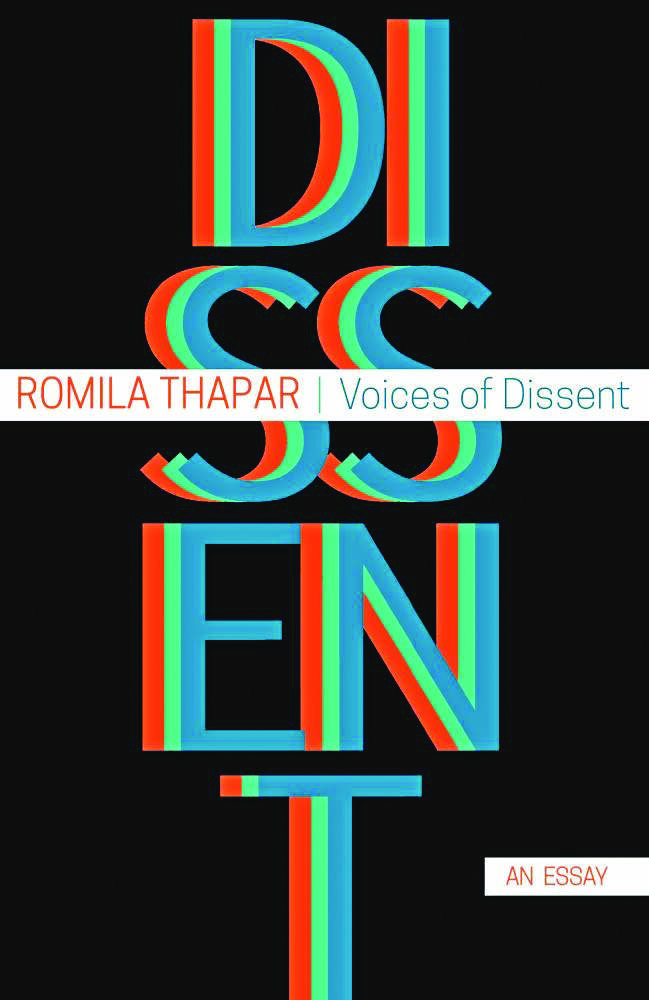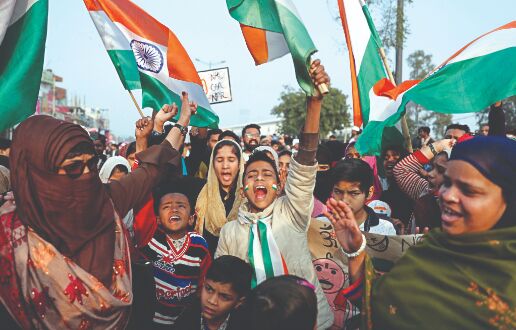"Voices of Dissent" | Is dissent necessary?
In Voices of Dissent, Romila Thapar explores how dissent has had a long history in the subcontinent, even if its forms have evolved through the centuries. Thapar looks at the articulation of dissent—focusing on non-violent forms—that which is so essential to all societies, and relates it to various moments of time and in varying contexts as part of the Indian historical experience; Excerpts:
Author: Romila Thapar
Publisher: Seagull Books
Dissent is, in essence, the disagreement that a person or persons may have with others, or, more publicly, with some of the institutions that govern their patterns of life. People have disagreed since time immemorial; they have argued, or agreed to disagree, or eventually arrived at an agreement. That is all part of life, of living. Most institutions that have an influence on our daily lives tend to have long histories; many have evolved in variant ways, and we are only now beginning to recognize that the questioning of how they function is not as recent an activity as we were imagining it to be—in fact, it has been practised for centuries.

Dissent is part of a larger body of varieties of differences that arise out of questioning and critical enquiry or just by giving vent to another experience. In writing about it, I am not downgrading other forms but trying to look more closely at those that we have neglected in our construction of the past and its culture, that which we claim to have inherited and which we acclaim in present times. Given that we continue to construct the past, the concepts we use to do so are also undergoing a similar construction. In order to explore these, it is necessary to take up leads old and new. A fuller investigation of dissent would have to examine situations where the dissent leads to protests, violent and nonviolent. My intention, however, is to make audible—symbolically—the voices of nonviolent dissent.
Dissent is not a modern concept, but recognizing it in its various forms is new, as is the fact that, in a truly liberal, democratic society, such questioning is not frowned upon but, rather, encouraged and explored through discussion. The right to question is now public, open and can be exercised by any citizen. earlier, only the powerful had this right, but today it extends—in theory at least—to all citizens. In earlier times the right was often argued over but did not always become a public issue as it can in our times. This in part places a responsibility on us to recognize and understand the centrality of dissent. Implicit in having these rights is the exercising of dissent where we think it appropriate. This has a historical continuity even if the forms have altered. I would like to explore the continuity through a few examples.
There should always be, invariably, in every modern society, the right of the citizen to dissent as part of the right to free speech. This right has been contentious yet crucial to the continuity of societies. However much we may wish otherwise, Indian society—as indeed every other society—has not been a seamless harmonious entity, with little or no contradictions. we too have had our share of intolerance and violence and the clash of ideas. Dissenting voices have been many, and have had a much wider articulation in the past than we are willing to concede.
In historical terms, social relationships were encapsulated, as they often still are, in the binaries of those who had power and ownership—be it of land, property, rituals or whatever gives power—and those who did not. We know this relationship through conjugations such as raja and praja, the feudal lord and serf, the factory owner and employee, the colonizer and colonial subject. A couple of centuries ago, this gave way, through an overwhelming historical change, to a society that speaks of industrialization, capitalism, the middle-class control of new technology, the workers who provide the labour, the peasants on whom agricultural production depends, and such like. one of the factors that was intended to bind this new society together was nationalism, or the sense of people belonging to one nation, therefore nationhood. The massive change implicit in this, it is assumed, would be the evolving of a different relationship that determines the functioning of society. In the functioning of a nation, what matters is the relationship between the people as citizens and what they have created jointly—the state. The rights of the citizens vis-à-vis the state have therefore moved centrestage.
This historical phase also marks an alteration in the forms of governance—the earlier kingship is replaced by the emergence of democracies. Democracies can only be secular since every citizen has equal status. Their institutions have representatives from all sections of society, each having rights of equal status. This helps to integrate the secular, the democratic and the national. In a true democracy, the right to dissent and the need to meet the demand for social justice are core concepts. Since it includes all citizens and they are legally of equal status, a democracy cannot be other than secular.
These broad historical changes have been taken as among the markers of modern times. I would like to begin, however, by discerning more general features of dissent, in terms of how dissent is recognized. those dissenting do not always proclaim themselves as dissenters; sometimes, they may not even be fully aware of the degree to which they are dissenting. One of the more obvious ways of recognizing dissent is to mark the presence of ‘the other’ in society. This facilitates recognition and juxtaposes it to dissent.
But before I write about this, I would like to clarify why I disagree with what is now often said by those who are in fact opposed to democracy but won’t admit to it openly—it is said that dissent itself was imported into Indian society from the west. This is an argument made by those who visualize the Indian past as free of blemishes and therefore not requiring dissenting opinions. Such notions arise from wishful thinking. They were and are also exaggerated by descriptions of what have been called civilizations and ‘high cultures’, as magnificent achievements, free of fault and entirely acceptable to all those who contributed to their creation.
(Excerpted with permission from Romila Thapar’s Voices of Dissent; published by Seagull Books)



